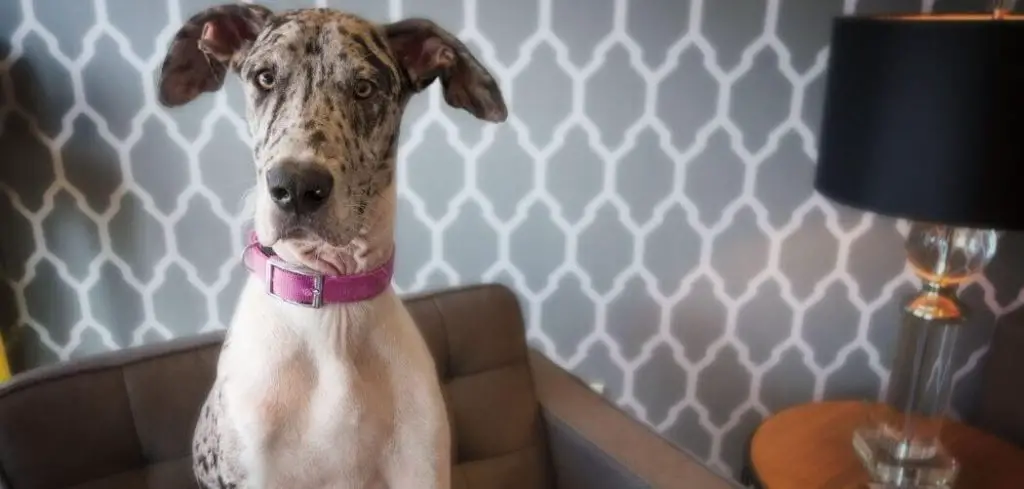Dogs explore the world with their mouths, but when your dog excessively licks everything—floors, furniture, toys, or even the air—it can signal something more serious than simple curiosity.
We outline the reasons why your dog is excessively licking everything, what you can do at home, and when to seek veterinary help.
Table of Contents
Dog Excessively Licks Everything — Why It Happens
Excessive licking in dogs can be driven by physical discomfort, behavioral issues, or even neurological conditions.
Dogs may lick excessively due to nausea, dental pain, anxiety, boredom, or compulsive behavior. Sometimes, underlying medical conditions such as gastrointestinal distress or cognitive dysfunction are to blame.
While some licking may seem harmless, persistent or unexplained licking deserves closer attention.

Dog Excessively Licks Everything: Common Causes
Gastrointestinal Discomfort
One of the most common medical causes of excessive licking is nausea or an upset stomach.
Dogs experiencing GI discomfort often lick at floors, carpets, or other surfaces in an attempt to soothe their nausea.
You may also notice lip-smacking, drooling, or signs of restlessness.
This behavior is sometimes linked to acid reflux, inflammatory bowel disease (IBD), or eating something that doesn’t agree with them.
If untreated, the underlying digestive issue can worsen, leading to further symptoms like vomiting or lack of appetite.
Read more: Dog Excessively Licking Other Dog (What it means and when to worry)
Dental Pain or Oral Irritation
If your dog is licking excessively, especially non-food objects or the air, it could be trying to cope with oral pain.
Dental diseases such as gum infections, broken teeth, or mouth ulcers can make a dog lick in response to discomfort. They may also paw at their mouth, chew oddly, or avoid food.
Oral health issues are not only painful but can lead to systemic infection if bacteria enter the bloodstream. This makes timely dental care essential.
Anxiety and Stress
Licking can be a self-soothing behavior for dogs who are anxious or stressed.
Dogs left alone for long periods or facing changes in their environment may begin to lick compulsively. This is particularly common in breeds prone to anxiety, like Border Collies or Chihuahuas.
Unlike casual licking, anxiety-driven licking is often repetitive, intense, and directed at random objects or surfaces. Without intervention, this habit can escalate into obsessive-compulsive behavior.
Boredom and Lack of Mental Stimulation
Dogs need physical and mental activity. Without it, they may turn to excessive licking as a way to occupy themselves.
This is especially true for high-energy or intelligent breeds that need regular exercise and interaction. A bored dog may lick furniture, floors, or their own body to pass the time.
While not always rooted in medical problems, boredom-driven licking can develop into habit-forming behavior that’s harder to break later.
Canine Cognitive Dysfunction (Dog Dementia)
In older dogs, excessive licking may be a sign of canine cognitive dysfunction, the dog equivalent of dementia.
This condition affects memory, awareness, and behavior. Affected dogs may lick at odd times, become disoriented, or have changes in sleep and bathroom habits.
Cognitive dysfunction is progressive, but early intervention with diet, supplements, and medication can help slow the decline and improve quality of life.
Allergies or Skin Irritations
Sometimes, a dog licking everything might actually be responding to itchy or irritated skin.
Environmental allergies (like pollen or dust mites), food allergies, or contact irritants can cause itching that drives compulsive licking. While they may lick their own body more, some dogs also lick floors or bedding as part of their response.
Chronic itching and skin inflammation can lead to secondary infections, so identifying and treating the allergy is crucial.
What to Do If Your Dog Is Excessively Licking Everything
Start by gently observing when and where your dog licks. Does it happen after meals? When you’re away? At night?
Try removing access to the most commonly licked objects and see if the behavior changes. Offer puzzle toys, extra walks, or interactive play sessions to redirect their focus.
Ensure they have a regular feeding schedule and are eating a balanced diet that supports digestive health.
Regular grooming and checking for signs of skin irritation or dental issues can also provide helpful clues.
If anxiety seems to be the cause, use calming aids like pheromone diffusers or anxiety vests, and consider a behaviorist consultation.
Avoid punishing the behavior, as this can increase stress and make the issue worse.
When to Call or Visit Your Vet
If your dog’s licking seems obsessive, frequent, or accompanied by other symptoms, it’s time to call the vet.
Watch for signs like vomiting, diarrhea, loss of appetite, drooling, coughing, or weight loss. These could indicate an underlying illness.
Dental disease, skin conditions, and digestive disorders all require veterinary diagnosis and treatment.
Sudden onset of excessive licking in older dogs may point to cognitive decline and should be evaluated promptly.
Behavioral causes like anxiety or compulsive disorder also benefit from professional input, especially if home changes aren’t helping.
Early intervention improves outcomes, whatever the cause.
Read more: Dog Excessively Licking My Hand (Is it affection or a red flag?)
Key Takeaway
Excessive licking in dogs can be puzzling and frustrating, but it often signals something worth investigating.
From nausea and dental pain to anxiety or aging-related changes, a wide range of issues can trigger this behavior.
Pay attention to patterns, rule out environmental factors, and seek veterinary guidance if needed.
With patience and support, most dogs can overcome compulsive licking and feel more comfortable in their daily lives.
